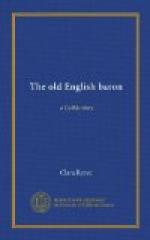“After the King had chastised the rebels, and obtained the victory, the Lord Lovel was expected home every day; various reports were sent home before him; one messenger brought an account of his health and safety; soon after another came with bad news, that he was slain in battle. His kinsman, Sir Walter Lovel, came here on a visit to comfort the Lady; and he waited to receive his kinsman at his return. It was he that brought the news of the sad event of the battle to the Lady Lovel.
“She fainted away at the relation; but, when she revived, exerted the utmost resolution; saying, it was her duty to bear this dreadful stroke with Christian fortitude and patience, especially in regard to the child she went with, the last remains of her beloved husband, and the undoubted heir of a noble house. For several days she seemed an example of patience and resignation; but then, all at once, she renounced them, and broke out into passionate and frantic exclamations; she said, that her dear lord was basely murdered; that his ghost had appeared to her, and revealed his fate. She called upon Heaven and earth to revenge her wrongs; saying, she would never cease complaining to God, and the King, for vengeance and justice.
“Upon this, Sir Walter told the servants that Lady Lovel was distracted, from grief for the death of her Lord; that his regard for her was as strong as ever; and that, if she recovered, he would himself be her comforter, and marry her. In the mean time she was confined in this very apartment, and in less than a month the poor Lady died. She lies buried in the family vault in St. Austin’s church in the village. Sir Walter took possession of the castle, and all the other estates, and assumed the title of Lord Lovel.
“Soon after, it was reported that the castle was haunted, and that the ghosts of Lord and Lady Lovel had been seen by several of the servants. Whoever went into this apartment were terrified by uncommon noises, and strange appearances; at length this apartment was wholly shut up, and the servants were forbid to enter it, or to talk of any thing relating to it: However, the story did not stop here; it was whispered about, that the new Lord Lovel was so disturbed every night, that he could not sleep in quiet; and, being at last tired of the place, he sold the castle and estate of his ancestors, to his brother-in-law the Lord Fitz-Owen, who now enjoys it, and left this country.”
“All this is news to me,” said Edmund; “but, father, tell me what grounds there were for the lady’s suspicion that her lord died unfairly?”
“Alas!” said Oswald, “that is only known to God. There were strange thoughts in the minds of many at that time; I had mine; but I will not disclose them, not even to you. I will not injure those who may be innocent; and I leave it to Providence, who will doubtless, in its own best time and manner, punish the guilty. But let what I have told you be as if you had never heard it.”




